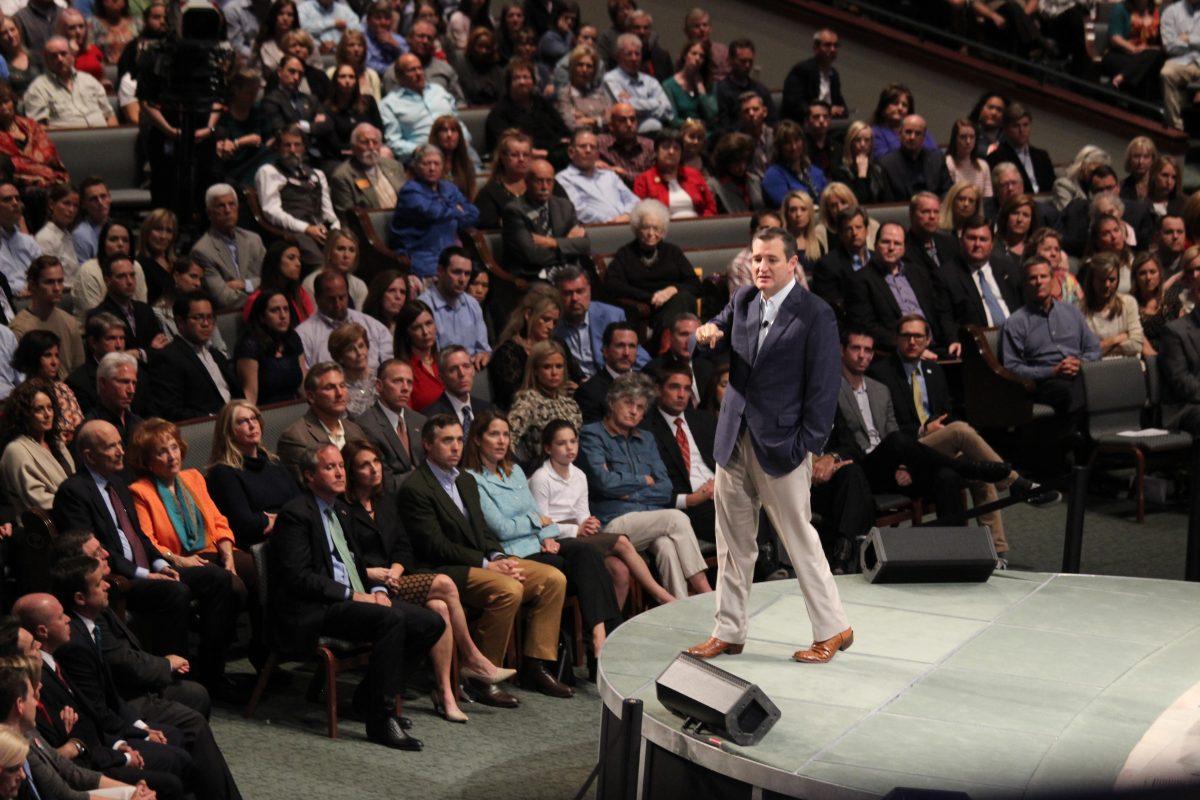Plano church forum with presidential candidates highlights growing influence of Christianity on conservatives
The church auditorium was filled with enthusiasm as the six presidential hopefuls strolled onto the stage. The audience looked forward to hearing about how religion plays a role in the candidates’ personal and political lives.
On Oct. 18, Prestonwood Baptist Church partnered with the Faith & Freedom Coalition to hold a forum to discuss the importance of faith in public life. Over 7,000 people attended the event, with 10,000 more watching the livestream online. Among the candidates present were Carly Fiorina, Governor Jeb Bush, Senator Rick Santorum, Ben Carson, Senator Ted Cruz and Governor Mike Huckabee.
The forum allowed each candidate 10 minutes to address the audience, and then another 10 minutes for a discussion led by Jack Graham, the pastor of the congregation.
Candidates discussed political issues such as the defunding of Planned Parenthood and the perceived attack on Christianity in America. While they mostly stayed within the realm of politics, candidates often talked about religion and how it affects their political and personal lives.
“The Bible is very clear about the responsibility to help the poor. It’s mentioned hundreds of times in the Bible, (but) I don’t think anywhere in the Bible (it says) that the government is supposed to do that,” Santorum said.
This forum was particularly unusual because of the number of candidates attending the event. Political science professor Thomas Brunell said that he has rarely seen an event like this hosted by a church.
“I don’t know if I’ve ever heard of a church getting multiple people like this to have a pseudo-debate,” Brunell said. “Of course, politicians go to churches all the time, so that’s not surprising.”
During the primaries, many Republican candidates try to win votes by appealing to the right wing crowd. One way they do this is by visiting churches since a majority of Republicans are Christians.
“The first thing you have to do is win the primary, and the way you do that is appeal to the average Republican voter who is going to vote in the primary,” Brunell said. “That’s somebody who is further to the right and much more likely to be conservative, but also more likely to be religious as well.”
While the event at Prestonwood was unique, religion in politics isn’t a new phenomenon.
“I think that religion has always been a part of American politics like this and we always talk about the separation of church and state. But our leaders have very traditionally been church-going people,” Brunell said. “Even to the extent that I think that non-believers and non-church going people, if they want to be elected to public office, they have to go to church.”
Voters are also affected by this close relation between religion and politics.
Biology junior Julia Craig, who is a member of Campus Outreach, believes that many of her political and personal decisions are affected by her faith.
“I am very religious, all of my decisions are based on the Lord and what His word says, or at least I try to make them be,” she said. “I can’t separate my church and my state so I’m going to push for those people who have ideals alongside mine who are going to make those happen.”
Similarly, mechanical engineering sophomore Morgan Cannon, a member of the UTD chapter of the Fellowship of Christian University Students, believes that religious and political views are difficult to separate from one another.
“I feel like it’s so hard for it not to be interconnected,” she said. “Your religious beliefs affect every other part of your life and the decisions you make and how you treat people. I think it’s very hard to separate the two.”
While healthcare studies junior Dawn McElroy is a Christian and favors the inclusion of those ideas in politics, she recognizes the limitations of using religious beliefs to justify political actions.
“You can take something from the Bible or another religion’s holy book and justify it with, ‘Well, this is what God told me to do, so I think that we should do it,’ and I think it becomes tricky because if you’re using this divine intervention that is skewed or isn’t the truth, then it ends up doing more harm than good,” McElroy said.
A study done by the Pew Research center in 2011 shows that 70 percent of Protestants favor the GOP party. Similarly, Gallup polls show that, in 2011, 68 percent of Democrats are pro-choice regarding abortion. McElroy believes that both parties have strayed from the fundamentals of Christianity.
“The Democrats, most of them are for abortion, and I don’t think that that’s what the Bible (says),” she said. “On the flip side, I feel that the Republicans are decreasing funding for things like Medicaid, Medicare and social security. The Bible also teaches you need to take care of the poor and the less fortunate.”
While the forum didn’t give a voice to every Christian in the country, one candidate said he believes it’s time to put more of an emphasis on faith in the political realm.
“I think one of the reasons the doors are opening (is) because it’s time to bring God back to our country,” Carson said.





